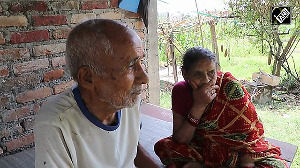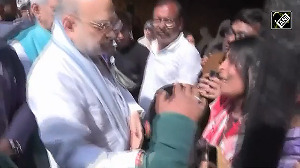Thank god, then, for Andrew Ward.
With his book Our Bones Are Scattered: The Cawnpore Massacres and The Indian Mutiny Of 1857 (Henry Holt and Co, 1996), Ward not only gives us tales guaranteed to shock, he raises the ghosts of soldiers, British and Indian, long since forgotten in the hot, dusty India of another era.
Using scrupulous research as a backbone, Ward recreates, in shocking detail, events of 150 years ago that would go on to shape the fate of a nation. From the sparks that ignited a revolt, he documents a chain of massacres and violent reprisals that led to one of the bloodiest moments in Indian, and British, history.
The Rediff Special: 1857, the First War of Independence
This is like fine journalism -- the way Ward negotiates each turn in the story, fleshing out the major characters that played their parts and exited, often in a spurt of aggression. The book's cover illustration -- The Treacherous Massacre of English Women and Children at Cawnpore by Nena Sahib, 1857 (National Army Museum, London) -- sets the tone for what lies within.
Ward lists the causes and issues that led to mass-slaughter in 1857, in an event that would effectively end the prolonged domination of Britain's East India Company, kicking into motion what would end with India emerging as a sovereign republic.
Although he lives in the United States, the writer's fascination with 1857 may stem from a childhood spent in India. This isn't his first account of those massacres either. In 1985, Ward published a novel about Kanpur (once Cawnpore) titled The Blood Seed.
Lessons from 1857: Don't forget the past
History, despite the great many things it has to tell us, doesn't often yield the pleasure of a comprehensive perspective either. There will always voices of dissent raised when one historian lays claim to his or her idea of the truth. Ward's book is no exception.
Like the last impressive book on the subject, Christopher Hibberts' 1978 Great Mutiny, Andrew Ward's account has raised a few eyebrows during the decade it has been in print. For instance, he restricts the role of Mangal Pandey -- now fashionably feted in Indian popular culture -- to a single episode of intoxicated buffoonery.
Ward warns that anyone trying to tell the story of the Kanpur massacres must 'subsist on a sometimes sparse diet of questionable depositions, muddled accounts, dubious journals, and the narratives of shell-shocked survivors with axes to grind.'
Did the Indians tell the British what the latter wanted to hear? Did the British stage those bloody events in a manner that would help them justify their presence in a land not their own? Did the wealth and prestige guaranteed by controlling India nullify acts of murder? Ward raises, and answers, these and related questions in an interview with Senior Associate Editor Linday Pereira.
What is it about a 'mutiny' in another country that got you excited enough to begin what must have been a period of exhaustive research? How did your childhood in India expose you to the subject?
I was a 11-year-old boy in India when it celebrated the centennial of the Mutiny, or the First War of National Independence, as the government called it. I suppose it plugged into a gnawing anxiety I felt even at that age about being a member of a tiny minority in a strange country that nonetheless treated me like royalty.
I had seen the Hollywood version of Shakespeare's Julius Caesar on the boat to India, and I think the assassination scene engendered in me a suspicion that, behind all elaborate displays of reverence and awe, someone may be holding a dagger.
Are historians entirely accurate when they say the 1857 uprising was precisely what brought about the end of the British East India Company's rule in India? Wouldn't you agree that this would be a rather simplistic view?
I'm not sure I would agree. It was certainly the impetus for putting an end to the Company's ungainly rule. Though the scandals that attached to it from the time of Clive on and the semi autonomy with which its governors general ruled, had already given the Crown pause, the British government would have been more reluctant to take over from the Company had it not been for the uproar over the Mutiny.
Indians were, as you point out, hanged in their hundreds by the roadsides or blown to bits by cannons. Going by any possible interaction you may have had with Indians, or Indian Americans, would you say they are well informed of this dark period in their country's history?
No, but then, neither are Americans particularly well versed about slavery, the Civil War, Reconstruction, Jim Crow, and the campaigns against Native Americans, and perhaps for the same reasons. It was a squalid period on both sides of the equation: A lot of blood spilled on account of greed, fanaticism, arrogance and racism.
Revisiting 1857: Satyajit Ray's vision
You refer to Mangal Pandey as an 'inebriated sepoy' of the 34th Native Infantry responsible for a 'one man rebellion' of sorts, referring to the episode when he strutted before his regiment's lines at Barrackpore with a loaded musket, calling on his comrades to stand up against forced conversion. Do you condone the lionised image of Pandey that currently holds sway in Indian pop culture?
I think Indians, like everyone else, should be free to invent whatever heroes they like, so long as they recognise that they are inventions. I think Pandey was simply an agent of his comrades' disaffection, and like a character in a cartoon, stepped forward only to find that he had stepped off a cliff. On the other hand, we don't know enough about him as a man to deem him a hero or simply an ordinary man caught up in circumstances and emboldened by drink, which makes him a useful vessel for novelists and filmmakers of all stripes.
But, for my money, there were plenty of bona fide heroes on the rebels' side: the Rani of Jhansi; old Kunwar Singh of Bihar; Sheikh Abdullah Beg at Delhi and Rooyah; and even Tatya Tope who, despite his role in the massacre at Satichaura Ghat, was perhaps the ablest and most tenacious of all Mutiny commanders.
The wells that the British filled with corpses have yet to be memorialised. Has Kanpur been replaced by the Jallianwallah Bagh massacre in the popular Indian imagination?
It should be. But perhaps after all this time has passed, one well need not cancel out the other, for the victims buried in all those wells were ordinary people like ourselves.
How do you explain what, in your own words, you refer to as a 'dearth of primary material from the Indian side of the equation'?
Vast amounts of material from rebellious courts were simply destroyed by the returning British, and large files lost when one of the ships that carried British survivors bound for England was wrecked off the African coast. Other documents were lost during the later stages of the Mutiny when the rebels were on the run.
Regarding Kanpur in particular, many of the Collectorate records from the Mutiny period have disappeared over the past 30 years. And then, more generally, the Indian climate is not kind to documents of any kind. Many were no doubt devoured by mice, rats, and white ants, or mildewed and disintegrated over decades of monsoons.
What about the events of 1857 surprised you most, once your research was complete?
The savagery of British retribution, and the leading role played by the Missionaries and 'New Lights' -- the nineteenth century version of Born-Again Christians -- among the Company's ranks in convincing many Indians that the British were not content merely to rule their country but intended to steal their souls. They believed their identities were threatened, and that is the point at which many people resorted to violence.
Bahadur Shah Zafar has lately, thanks to renewed interest in his life and times, begun to be seen in a new light, one of regret at the way his life changed following the uprising. Were you particularly moved by any of the figures -- Indian or British -- that featured prominently in the events of that year?
Certainly, but not by Bahadur Shah and the princes who took part in the fight on either side. I was especially moved by the common people of every race and religion who were caught up in this catastrophe: especially by the plight of what were called Eurasians -- the mixed-race progeny of British men and Indian women who were caught in a kind of limbo between the two sides, despised by one side for the blood of the other.
One of them, William Jonah Shepherd, who lost his entire family at Kanpur and never recovered from all he suffered, nor found his footing in the new Indian Empire, seemed to me to personify that dilemma. He had hoped the Eurasians would proliferate and someday unite Indians and Britons under their rule, but died a heartbroken man.
How drastically different do you think things would have been if 1857 and 1858 were uneventful years in India? Would the eventual, and almost inevitable course of history -- rebellion, dialogue, independence -- really change?
Such what-ifs are intriguing, and fun to talk about over a couple of drinks, but so many scenarios crowd into my brain that I am not at all willing to commit to any one. Perhaps India would have remained Balkanised, although I am afraid it had been vulnerable to invasion for hundreds of years, and some other conqueror -- the Russians, perhaps -- might have taken the Company's place.
Perhaps a native ruler or council might have created a coherent State. Maybe some secular visionary like Akbar could have united the subcontinent. Perhaps Gandhi was an inevitability whatever the circumstances in the early twentieth century.
Whether any of these scenarios would have set India back from where it was in 1947 or where it is now I won't speculate, because the world should never underestimate the extraordinary brilliance and ingenuity of the Indian people, nor their ability to adopt and adapt the best of the cultures it sustains.








 © 2025
© 2025